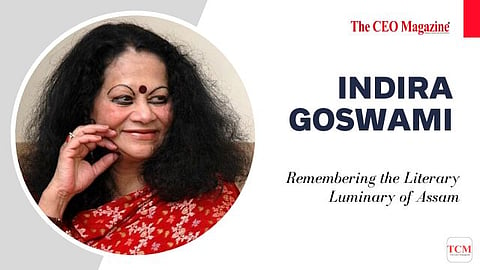
- News
- Women
- Magazine
- IndustryIndustry
- InsightsInsights
- Success Stories
- PublishPublish
- ContactContact
- Media KitMedia Kit

Indira Goswami
Remembering the Literary Luminary of Assam
Indira Goswami, fondly known as Mamoni Baideo and known by her pen name Mamoni Raisom Goswami, was an extraordinary Indian writer, poet, scholar, and professor, leaving an indelible mark on contemporary Indian literature. Her journey from a Vaishnavite Brahmin family in Assam to becoming a celebrated author was nothing short of remarkable.
Born on 14th November 1942 in Guwahati, Assam, to Umakanta Goswami and Ambika Devi, Mamoni Goswami had a deep-rooted connection with Assamese culture and literature. She attended schools in Guwahati and Shillong, where her literary talents began to emerge. She majored in Assamese literature at Cotton College in Guwahati and earned a master's degree from Gauhati University.
Mamoni Goswami's literary journey commenced with her debut collection of short stories, "Chinaki Morom," which she wrote while still a student. Her talent was recognised by Kirti Nath Hazarika, an editor who published her stories when she was just thirteen years old.
Mamoni Goswami's life was marked by personal struggles, including her battle with depression. She even faced suicide attempts during her youth, which she openly mentioned in her autobiography, "The Unfinished Autobiography."
Tragedy struck again when her husband, Madhaven Raisom Ayengar, passed away in a car accident just eighteen months into their marriage. This led to a period of severe depression, and she became addicted to sleeping tablets.
Despite these challenges, Goswami found solace in her writing. She once remarked that she wrote to survive and that it was her writing that kept her going. Her experiences during her travels across India, including Kashmir and Madhya Pradesh, found their way into her novels, such as "Ahiron" and "The Chenab's Current."
Mamoni Goswami's pursuit of peace of mind led her to Vrindavan, Uttar Pradesh. During her stay in Vrindavan, she wrote "The Blue-Necked Braja," a novel that shed light on the plight of the Radhaswamis, who endured poverty and sexual exploitation in their daily lives.
The book explores the challenges faced by young widows in seeking companionship and navigating the moral dilemmas associated with their religious beliefs.
After relocating to Delhi, Mamoni Goswami joined the University of Delhi as a Professor of Assamese. During her time at the university, she authored some of her most significant works. Her short stories, including "Hridoy," "Nangoth Sohor," and "Borofor Rani," used Delhi as the backdrop.
Her contributions to the university extended beyond her teaching role. She, along with Assamese writer Arnab Jan Deka, successfully lobbied to establish a Chair in the name of the Middle Age Assamese saint-philosopher-littérateur-artist Srimanta Sankardev at Delhi University.
Goswami's notable novels, including "Pages Stained With Blood" and "The Moth Eaten Howdah of a Tusker," were also penned during her tenure in Delhi. "Pages Stained With Blood" delved into the 1984 anti-Sikh riots following the assassination of Prime Minister Indira Gandhi, while "The Moth Eaten Howdah of a Tusker" addressed the struggles of Assamese Brahmin widows.
One of her most controversial works, "The Man from Chinnamasta," critiqued the age-old tradition of animal sacrifice in the Kamakhya Temple in Assam, resulting in threats to her life. This powerful novel argued for worshipping the Mother Goddess with flowers rather than blood.
Mamoni Raisom Goswami's literary contributions were vast and included novels like "The Chenab's Current," "Ahiron," "Budhosagor Dhukhor Geisha Aru Mohammed Musa," "Udaybhanur Choritro," and "Thengphakhri Tehsildaror Tamor Taruwal."
Apart from her novels, Goswami also explored other genres. She penned an autobiography titled "An Unfinished Autobiography." Her poetry collections included "Pain and Flesh," "Pakistan," and "Ode To A Whore." She contributed to non-fiction with her work on the comparative study of Tulsidas's Ramayana and the Assamese Ramayana, titled "Ramayana from Ganga to Brahmaputra."
Mamoni Raisom Goswami's literary contributions earned her numerous awards and honours. She received the Sahitya Akademi Award in 1982 for "Mamore Dhora Tarowal." She was also honoured with the Jnanpith Award in 2000, one of India's most prestigious literary awards.
Goswami was known for her unwavering commitment to social change. She played a crucial role in mediating between the United Liberation Front of Asom and the Government of India, leading to the formation of the People's Consultative Group, a peace committee.
Her works were not limited to print; some were adapted for the stage and film. The film "Adajya" was based on her novel and received international acclaim. Her life was portrayed in the film "Words from the Mist," directed by Jahnu Barua.
Mamoni Raisom Goswami passed away on 29th November 2011, leaving behind a literary legacy that continues to influence and inspire generations. Her fearless writing, commitment to social change, and dedication to her craft have solidified her position as an iconic figure in contemporary Indian literature.
Follow us on Google News
